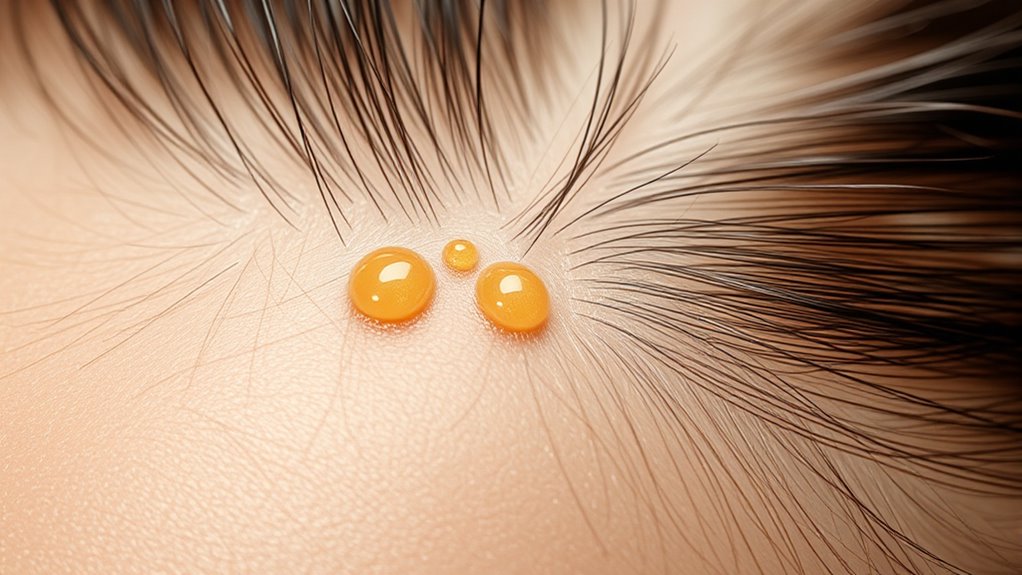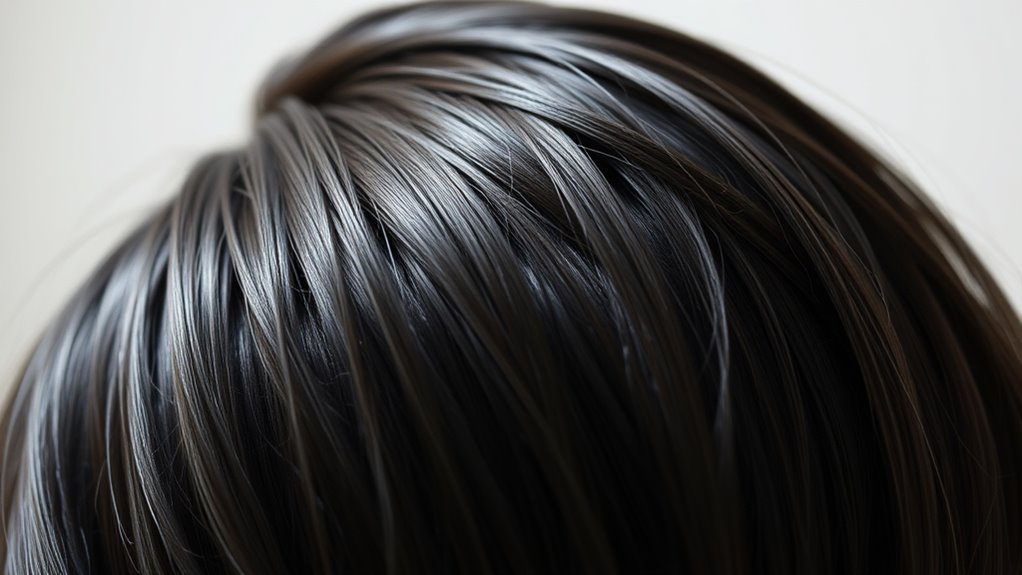Your sebum cycle isn’t the same for everyone; it’s influenced by hormones, environment, and diet. Washing your hair too often can strip moisture and cause your scalp to produce more oil, while too infrequent washing can lead to greasiness. The key is to find a balance based on how your scalp feels—whether it’s greasy, itchy, or dry. Discovering your ideal routine can help keep your scalp healthy and your hair fresh longer.
Key Takeaways
- Sebum production follows natural daily rhythms, varying by individual and influenced by hormones, environment, and diet.
- Over-washing can strip moisture, causing scalp dryness and increased oil production; under-washing allows buildup and greasiness.
- Proper washing frequency depends on your scalp’s signals, such as greasiness, itchiness, or dryness, rather than a fixed schedule.
- Focus on gentle scalp massage and hydration to regulate sebum levels, avoiding aggressive scrubbing or stripping moisture.
- Use tailored hair care routines with appropriate products like lightweight serums or dry shampoos to maintain balance.

Have you ever wondered why your skin produces more oil at certain times? The answer lies in your sebum cycles, which regulate how much oil your scalp and skin produce throughout the day. Your scalp’s oil production isn’t random; it follows a natural rhythm influenced by your hormones, environment, and even your diet. When your scalp produces excess oil, it can lead to greasy hair, clogged follicles, and even dandruff. But if you wash too often, it risks stripping away essential moisture, upsetting your scalp’s natural balance. Striking the right balance involves understanding your scalp’s hydration needs and using proper oil absorption techniques. Recognizing the importance of toilet functionality and maintenance can help you choose products and routines that support scalp health. Your scalp hydration plays a critical role in managing sebum cycles. When your scalp is well-hydrated, it produces less excess oil because the skin’s barrier remains intact and healthy. Conversely, if your scalp becomes dry or irritated, it may signal your body to produce more oil as a protective response. This is why over-washing can backfire, stripping away natural oils and prompting your scalp to overcompensate by producing even more oil. To maintain ideal scalp hydration, consider gentle, sulfate-free shampoos and avoid hot water, which can strip away moisture. Regularly using scalp conditioners or hydrating treatments can also help keep your scalp balanced and less prone to excess oil production.
Understanding your sebum cycles helps maintain healthy, balanced scalp hydration and oil levels.
Understanding oil absorption techniques can help you manage how much oil stays on your scalp and hair. When you do wash your hair, focus on the scalp rather than just the strands, using your fingertips to gently massage the scalp to remove excess oil without overly stripping it. Avoid aggressive scrubbing, which can damage hair follicles and lead to increased oil production. After washing, using a lightweight, oil-controlling serum or a mattifying spray can help absorb residual oil throughout the day. These products are designed to wick away excess oil without clogging pores or disrupting scalp hydration. Additionally, applying a small amount of dry shampoo between washes can help absorb surface oils and extend the time between washes, especially when your sebum cycles are at their peak.
Ultimately, there’s no one-size-fits-all answer to how often you should wash your hair. Your sebum cycles, scalp health, and lifestyle all influence the ideal frequency. Paying attention to your scalp’s signals — like greasiness, itchiness, or dryness — and adjusting your washing routine accordingly will help maintain a healthy balance. Using proper oil absorption techniques and focusing on scalp hydration ensures you don’t strip away too much moisture or leave excess oil to build up. Remember, the goal is to find a routine that keeps your scalp comfortable, your hair fresh, and your sebum cycles in harmony.
Frequently Asked Questions
Can Washing Hair Too Often Damage My Scalp’S Natural Oils?
Washing your hair too often can strip away your scalp’s natural oils, leading to scalp irritation and dryness. When you over-wash, you remove these protective oils, which can cause your scalp to produce even more oil. Plus, frequent washing may trap product buildup, making your hair look dull and greasy. To keep a healthy balance, wash when needed and use gentle shampoos to avoid disrupting your scalp’s natural oils.
Does Hair Type Influence How Often I Should Wash My Hair?
Think of your hair as a garden; different plants need varying care. Your hair texture and scalp sensitivity are like the soil’s needs—curly hair retains oils longer, so you might wash less often, while straight hair may need more frequent washing. Recognizing these differences helps you tailor your routine, preserving natural oils and avoiding scalp issues. Adjust based on your hair’s response, and find your perfect balance.
Are There Specific Shampoos for Balancing Sebum Production?
You’re wondering if there are specific shampoos for balancing sebum production. Yes, medicated shampoos and clarifying formulas are designed to help regulate oil levels. Look for products containing ingredients like salicylic acid, zinc pyrithione, or tea tree oil, which can control excess oil and reduce scalp buildup. Use these shampoos as directed, usually once a week, to keep your scalp balanced without over-drying.
How Does Diet Impact Sebum Production and Hair Health?
Think of your diet as the blueprint for your hair’s health. Your diet influence directly affects sebum production and overall hair condition. Nutrients like omega-3s, vitamins A, E, and zinc help regulate sebum, preventing excess oil or dryness. When you eat balanced, nutrient-rich foods, you’re setting the foundation for a healthier scalp and shinier hair. Skimp on these, and your hair might overproduce oil or become brittle, affecting your hair’s resilience.
Can Natural Remedies Effectively Manage Excess Oil Production?
You might find that natural remedies can help manage excess oil production. Herbal treatments like tea tree oil or witch hazel can clarify your scalp without stripping moisture, while dietary supplements such as zinc or omega-3s can balance oil levels from within. Incorporating these options into your routine may reduce oiliness, improve hair health, and lessen your reliance on harsh shampoos. Just remember to stay consistent and monitor how your scalp responds.
Conclusion
Now that you know how sebum cycles work, it’s clear there’s no one-size-fits-all answer. Listen to your scalp’s signals and find a routine that works for you—after all, you don’t want to throw the baby out with the bathwater. Whether you wash daily or less often, trust your instincts and keep an eye on your hair’s health. Remember, sometimes you gotta read between the lines to strike the perfect balance.








